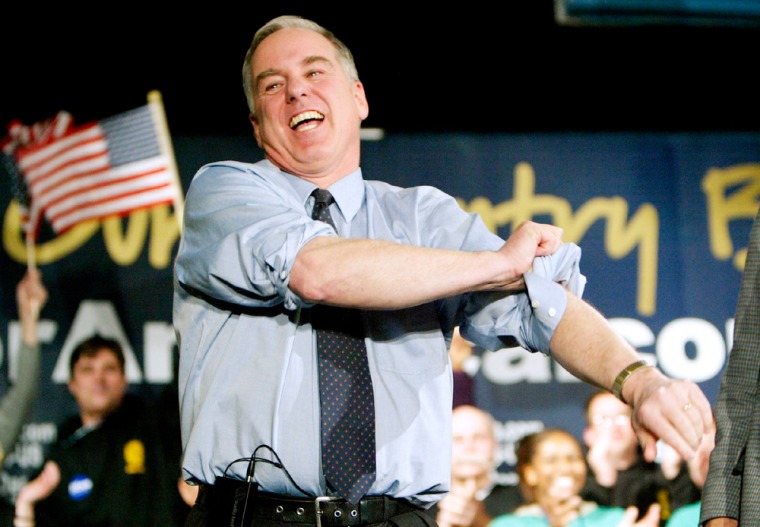Democrats face decisions in the weeks ahead that will help determine what image the party presents to voters in the 2006 elections.
As party leaders and grassroots activists try to recover from the party’s losses in last month’s elections, they are wrestling with these crucial choices:
- Choose Howard Dean as the new chairman of the Democratic National Committee to capitalize on the fervor that propelled him to presidential contender status last year? Or opt for a Washington insider such as former Clinton White House deputy chief of staff Harold Ickes?
- Mount a Senate filibuster to block President Bush’s nominee to any opening — most likely the chief justice’s spot — on the Supreme Court? Or forego the filibuster and likely lose an up-or-down vote on Bush’s choice of a conservative such as Justice Antonin Scalia?
- Vote for continued funding for military operations in Iraq? Or, as was done during the Vietnam War, and in line with the current sentiment of many rank-and-file Democrats, try to cut off funding and force the withdrawal of U.S. troops?
- Redouble the party’s commitment to a robust policy of battling Islamic terrorists — or advocate a less confrontational approach?
- Oppose Bush’s push to redesign Social Security with voluntary private accounts? Propose a tax increase to make the system solvent? Or sign on to some version of the private accounts concept?
Even with six weeks of recuperation, there is no way for party leaders to avoid acknowledging the elections’ grim outcome for Democrats: When Congress convenes on Jan. 3, the Democrats will be 17 seats short of a House majority and, more remarkably, will have only 44 seats in the Senate, the fewest number they have had since 1931.
Since Iraq and the war against Islamic terrorists were such important issues in the election and since the U.S. entanglement in Iraq continues to dominate the nation’s news menu, it is on foreign policy issues especially that the party will redefine itself.
“We have to come to grips with the real reason we lost this election: Whether we like it or not, too many Americans doubt whether we will be tough enough in the war on terror,” said Al From, founder and chief executive officer of the centrist Democratic Leadership Council.
Liberals and 'totalitarian Islam'
New Republic editor Peter Beinart, whose cover story in his magazine on the Democrats’ future is being hotly debated here in Washington, said last week, “One of the grave problems that liberals face today is that a passion for winning the struggle against totalitarian Islam is not at the core of what it means to be a liberal.”
Grass-roots Democrats, he said, are passionate about abortion rights, gay rights and universal health insurance, but have “very little passion for a positive program for winning the war against totalitarian Islam.”
In Beinart's view, filmmaker Michael Moore and the grass-roots group Moveon.org (2.9 million strong) have “a general hostility to the idea that American power, and certainly American military power, should be deployed in the world against the threat that was manifested on 9/11.”
Rebutting Beinart, Moveon.org executive director Eli Pariser said his group did not oppose fighting the terrorists after Sept. 11.
“If we can’t get serious about opposing the disastrous Bush policies (in Iraq), then we don’t have great hopes for putting forward a pro-active policy against al-Qaida in the future,” Pariser said. “Security and the fight against al-Qaida and other terrorists continue to be high on the agenda for Moveon members, but we do not believe, like Beinart does, despite all evidence, that this war is making us safer.”
Beinart said the Iraq war, even though mismanaged, in his view, by Bush, does not invalidate “the notion that American power should be dedicated to the proposition that we need to promote liberalism in the Muslim world.”
He added, “liberals have something absolutely central to contribute to winning this war against totalitarian Islam. If they make it their own identity, they can do it better than conservatives have.”
Beinart’s call to arms is not surprising, coming as it does from a magazine that endorsed Iraq hawk Sen. Joe Lieberman, D-Conn., in last year’s struggle for the party’s nomination.
Lieberman ended up winning only nine percent of the vote in the New Hampshire primary and dropped out of the race, evidence that the Lieberman-Beinart view is far from the dominant ideology among the Democrats.
Robert Borosage, co-director of the Campaign for America's Future, a left-leaning group, said that Sen. John Kerry, Sen. John Edwards, and other Democrats voted in October 2002 to authorize Bush to go to war against Saddam Hussein “because it was the politically expedient thing to do. Then the war went bad and they got caught … trying to figure out how they were going to explain why they were really opposed to this war that they had authorized the president to make. They looked like they were prepared to sacrifice crucial national security questions — whether we send young men and women into war — for their own political position.”
Once the Iraqi elections are over, Borosage predicted, leading congressional Democrats will call for withdrawal of U.S. troops according to a definite schedule.
Filibuster court nominee?
For one of the party’s core constituencies, abortion rights advocates, the question in the weeks ahead is what kind of Supreme Court nominee Bush would send to the Senate and whether Democrats will fight that nominee with the most potent tool they have, the filibuster.
Kim Gandy, head of the National Organization for Women, said Thursday she and other feminists are fully expecting Democratic senators to filibuster.
“I assume the first nomination is a conscious, red-flag affront to Democrats. It will be Clarence Thomas or Scalia or Alberto Gonzales,” Borosage said. “The entire base of the Democratic Party will demand that the party filibuster that nomination. That will be a moment of choice.”
But some Senate Democrats are wary of continuing a strategy of filibustering judicial nominees, seeing it as one of the factors that caused Democratic Leader Tom Daschle’s defeat in November.
Asked two weeks after the election whether Democrats would reconsider using the filibuster, Sen. Ben Nelson, D-Neb., who is up for re-election in 2006, said, “I think the caucus is going to rethink a lot of things, and that might just be one of them.”
When he gave his speech seconding the choice of Sen. Harry Reid, D-Nev., as the new Senate Democratic leader, Nelson stressed that Reid would “oppose (Bush) where necessary, compromise where possible and avoid the obstructionist label.”
That, of course, is the conundrum for Democratic leaders: Can they oppose Bush and thus maintain the fighting spirit of the Democratic activists, while at the same time, not be “obstructionist?”
Dean conciliatory on abortion
The abortion issue will likely drive much of the opposition to Bush’s judicial nominees. But on abortion, even Dean, an outspoken supporter of abortion rights, has chosen a more conciliatory tone than he sounded last year when he was seeking the party’s presidential nomination.

“We're not the party of abortion,” the would-be DNC leader told NBC’s Tim Russert last week on Meet the Press. “We're the party of allowing people to make up their own minds about medical treatment. It's just a different way of phrasing it. ... I have long believed that we ought to make a home for pro-life Democrats. The Democrats that have stuck with us, who are pro-life, through their long period of conviction, are people who are the kind of pro-life people that we ought to have deep respect for.”
On Social Security, the party faces the prospect of Bush and Republicans in Congress re-designing a program that is the crown jewel of Franklin Roosevelt’s New Deal legacy. Opposing private accounts may not be sufficient; Democrats may at some point offer an alternative plans to address Social Security’s insolvency.
According to the trustees of the Social Security system, unless Congress increases taxes, the system will be able to pay only 73 percent of the promised benefits starting in 2042.
On Thursday, John Sweeney, the head of the AFL-CIO, while opposing private accounts, suggested increasing the amount of earned income subject to the Social Security tax (capped next year at $90,000, but increasing every year).
Sweeney also suggested that instead of abolishing the estate tax, Congress should retain it and devote some of its revenue to shoring up Social Security.
Meanwhile, at least one House Democrat, Rep. Allen Boyd of Florida, has joined the private accounts movement: He’ll co-sponsor a bill with Rep. Jim Kolbe, R-Ariz., that would allow workers to divert some of their Social Security payments into private accounts, while also by the year 2011 raising the age at which workers would eligible for full retirement benefits to 67.
The Social Security battle, a possible Supreme Court vacancy and Iraq will likely be the trio of struggles in the coming year that define what it means to be a Democrat, who’s in the party and who will be leading it.
